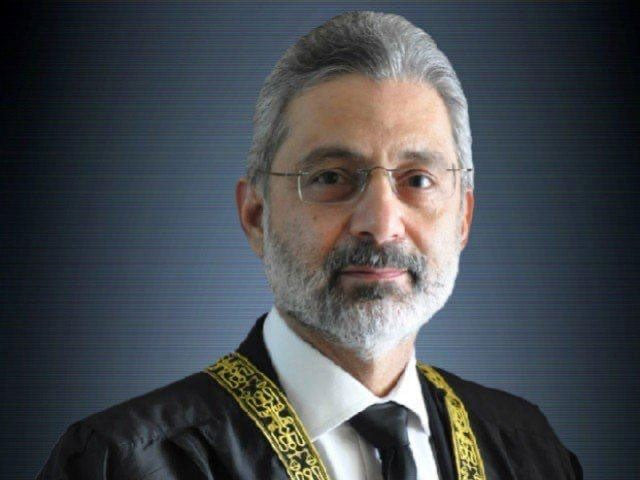Justice Isa backs seniority to appoint SC judges
Top court’s senior puisne judge writes letter to CJP, also send copies to two of his predecessors

Top court’s senior puisne judge Justice Qazi Faez Isa has strongly advocated appointments to the Supreme Court on the basis of the seniority principle in the absence of objective criteria.
Justice Isa, who is a member of the Judicial Commission of Pakistan (JCP), wrote a letter to chairman of the body, Chief Justice of Pakistan Umar Ata Bandial, wherein he explained the advantages of the appointment of chief justices of high courts as SC judges.
He also gave the reasons as why to why junior high court judges should not be elevated to the SC. A copy of the letter was sent to all JCP members, interestingly including two former CJPs.
The last six appointments to the top curt were made without adhering to the seniority principle. Currently, three posts of SC judges are vacant but the formal process to fill them has yet to start.
A senior bar representative claims that presently, most of the JCP members agree with their view that if there is no solid reason, then senior judges including high court CJs should be considered for appointment as SC judges, otherwise there will be a perception of “court packing”.
Justice Isa, in his letter, wrote that superior court judges were required to take an oath to preserve, protect and defend the Constitution. “An important component of this oath is to ensure that the peoples’ fundamental rights guaranteed by the Constitution are not trampled upon or trammeled. Therefore, an important factor to consider in the selection of superior court judges is also whether they have the requisite ability and determination to resist and repel unconstitutional acts, and the courage to preserve, protect and defend the Constitution,” it added.
Justice Isa noted that the longstanding practice was to appoint high court CJs to the Supreme Court because through their tenure in office, they would have gained valuable judicial experience covering a multitude of legal subjects; and would also be conversant with the multifarious issues and problems of judicial administration.
However, Justice Isa believes that the longstanding practice was discarded by two ex-CJPs, Mian Saqib Nisar and Gulzar Ahmed.
Read CJP Bandial named among Time's 100 Most Influential People
The letter stated that the Constitution did not stipulate creating an artificial polarity -- seniority versus merit. “These [former] CJPs assumed that seniority and merit were mutually exclusive, and by applying their self-justifying specious logic, unilaterally nominated candidates, whose merit they proclaimed. This resulted in the bypassing of high court CJs and senior judges.”
Justice Isa wrote that at times it was also asserted that their chosen nominee had decided a large number of cases. “But we all know that the workload on the judges of the Supreme Court is less than that on the judges of high courts -- which negates this sophistry."
He added that if competent but junior judges were appointed to the Supreme Court before they were ready, it neither served their interest nor that of the institution.
“These junior judges are deprived of the opportunity to serve as CJ of the high court, and resultantly do not acquire the rich experience gained from having held this office. Consequently, when the chief justice and senior judges were bypassed, a public perception developed that they were not competent; which undermined both their credibility and that of the institution. Natural human feelings of despondency and dejection set in amongst those who were bypassed (without good reason) which adversely affected their desire to work and the quality of their decisions."
Justice Isa also questioned the appointment of a Sindh High Court junior judge by ex-CJP Nisar.
He wrote that Nisar had sought to justify the nomination of a junior judge to the SC from the SHC by asserting without proof that neither the chief justice, nor any of the senior judges wanted to be appointed to the top court.
"However, the chief justice and the senior judges concerned tell a different story. The senior judges who were bypassed maintain that they were not informed that a judge junior to them was to be nominated, and that they had not declined, rather had demurred as a matter of courtesy to their chief justice."
Justice Isa believed that the eagerness for appointment was not an endearing quality, and might constitute a disqualifying factor.
"In any event Article 206(2) of the Constitution stipulates that: ‘A judge of the high court who does not accept appointment as a judge of the Supreme Court shall be deemed to have retired from his office.’ Therefore, to assert (and to do so without proof) that they had declined was disingenuous", read the letter.
He also said that ex-CJP Gulzar Ahmed had also bypassed the SHC CJ and senior judges by saying that they did not meet the merit test. He did this without having first established the criteria and the methodology to gauge merit.
“However, a few weeks later CJP Gulzar Ahmed proposed the name of the same SHC CJ for appointment as an ad-hoc judge to the Supreme Court. Had he now miraculously passed the elusive merit test?"
Meanwhile, a member of the Judicial Commission for Appointment of Judges in the High Court, has demanded reconstitution of the Judicial Commission of Pakistan (JCP) rules committee on an emergency basis to formulate criteria for the appointment of superior court judges.
Akhtar Hussain, a representative of the Pakistan Bar Council (PBC) in the JCP, has requested Chief Justice of Pakistan (CJP) Umar Ata Bandial to reconstitute the rules committee and suggested that the committee be headed by senior puisne judge Justice Qazi Faez Isa.



















COMMENTS
Comments are moderated and generally will be posted if they are on-topic and not abusive.
For more information, please see our Comments FAQ